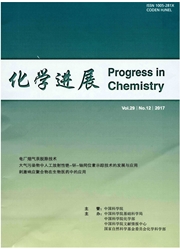

 中文摘要:
中文摘要:
碳水化合物脂肪酸酯(CFAE)作为一类非离子型生物表面活性剂,被广泛用于食品、医药及化妆品工业,一些CFAE还具有抗菌、抗肿瘤等特殊生物活性。非水介质中酶促区域选择性合成CFAE反应的瓶颈在于高极性碳水化合物与酰基供体不易相溶,并具有多个可酰化羟基。传统有机溶剂虽能提高极性底物在体系中溶解度,但常使酶活下降。新型绿色介质离子液体用于CFAE的酶法合成过程具有诸多优点,不仅生物催化剂能维持较好的活性与稳定性,且良好的底物溶解性可改善反应区域选择性及转化速率,反应体系还可重复利用。本文介绍了离子液体中影响酶促区域选择性合成CFAE反应的主要因素,包括酶、底物在离子液体中的溶解性能及底物自身性质等,详述了离子液体中酶促制备CFAE的研究进展,也指出了酶促合成CFAE存在的问题与发展前景。
 英文摘要:
英文摘要:
Carbohydrate fatty acid esters(CFAE) are nonionic biosurfactants,which can be synthesized from the enzyme-catalyzed esterification/transesterification of carbohydrates.These esters are increasingly used as valuable commodity chemicals in food,pharmaceutical and cosmetic industries.In addition,some CFAE also show antitumor and/or antibiotic activities.CFAE could be prepared enzymatically under mild conditions with a high regioselectivity.Synthesis of CFAE in non-aqueous solvents is difficult due to the low solubility of carbohydrates.The multi-hydroxyl groups of carbohydrates and the immiscibility with the acyl group donor are the major obstacles in the CFAE synthesis process.Although traditional water-miscible organic solvents also enhance solubility,they often inactivate enzymes.However,ionic liquids do not even when they have similar polarities.The use of ionic liquids has offered many advantages to the biocatalysis field,including improved enzyme's activity and stability,and better substrate dissolution makes the initial acylation faster and makes the regioselective acylation of sugars higher.Ionic liquids may be greener than organic solvents because the reaction system can be reused/recycled.Here,the main factors(enzymes,the solubility of substrates in ILs,property of substrates) affecting the enzymatic reaction are introduced.The latest progress of research on enzymatic synthesis of CFAE in ionic liquids is reviewed.In addition,the existing problems in the field of enzymatic synthesis of CFAE as well as its future perspectives are pointed out.
 同期刊论文项目
同期刊论文项目
 同项目期刊论文
同项目期刊论文
 期刊信息
期刊信息
